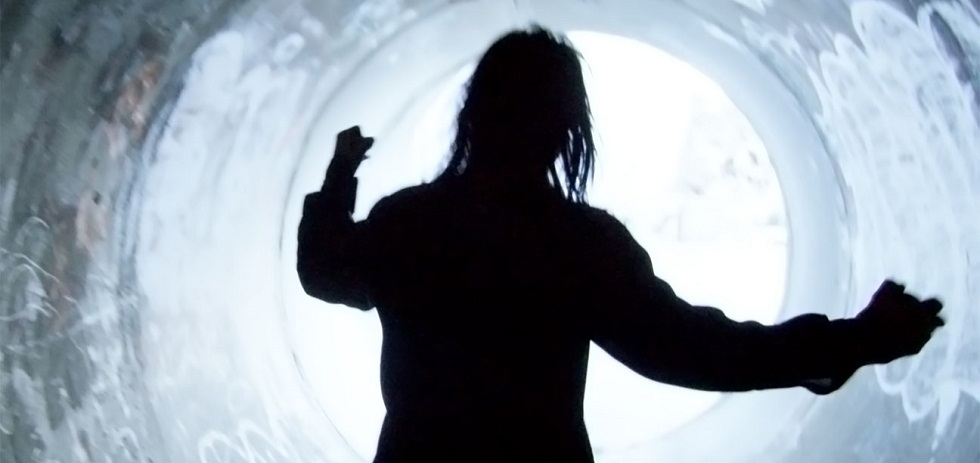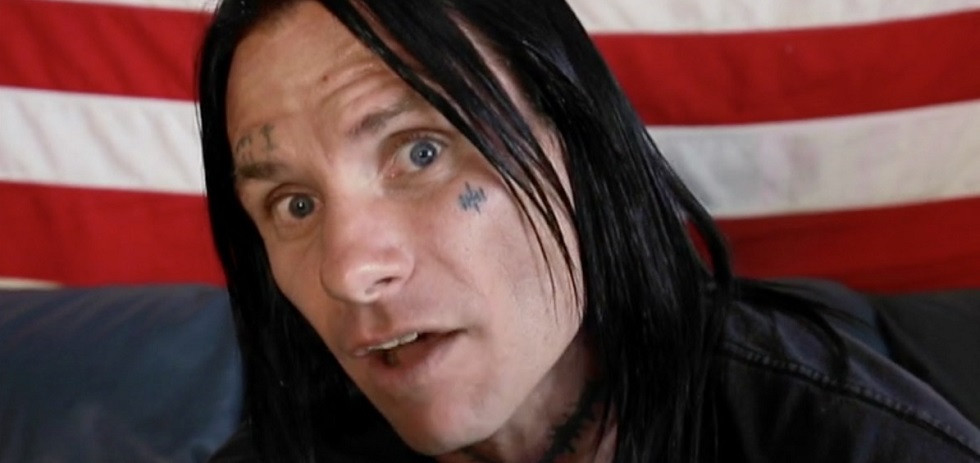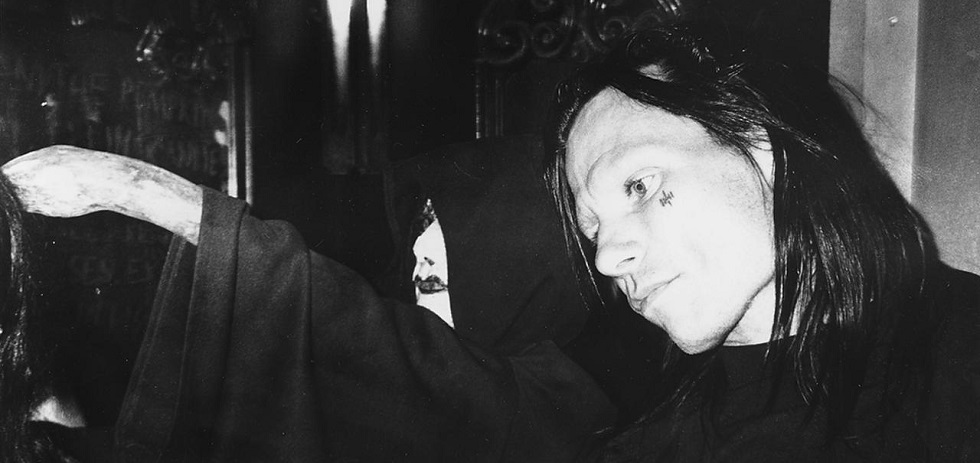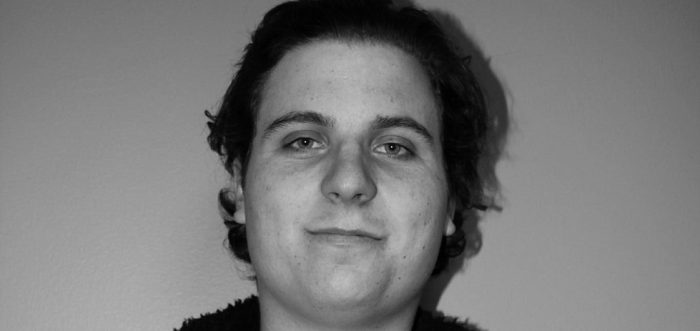Perhaps the most unsettling film in the Sydney Underground Film Festival lineup this year is a documentary about Edwin Borsheim, a little known musician from small-town California. Directed by 19 year-old filmmaker Jai Love, Dead Hands Dig Deep is the story of how Borsheim, as the lead singer of ’90s death rock band Kettle Cadaver, became a hit on the underground VHS circuit with his penchant for on-stage self-mutilation. Though the film contains enough gruesome footage to impress hardened exploitation fans, the film is more interested in the man behind the masochism. Like a demented Searching for Sugarman, it is a study of a shocking urban legend and the story of the broken, drug-addled man underneath it.
What was your experience with filmmaking before making this movie?
I wasn’t very experienced at all. I had made a couple of short films with my friends in high school but that was all pretty relaxed. I got into film school in 2014 and I did a couple of little things there, but most of my experience comes from working on film sets. I was a PA on Mad Max: Fury Road, and I got this great experience interning on The Homesman with Tommy Lee Jones. All of that just made me realise I wanted to make my own films.
Could you talk about how you came upon the story?
I meet Edwin through a friend who ended up producing the film [Spencer Heath]. He was from the town that Edwin was from [Temecula, California] and they had met when Edwin’s brother passed away because they were all friends with him. At that time no one had seen Edwin for a few years so they talked to him and started hanging out. Really though, I was first introduced to Edwin via his work. I saw a DVD of him performing and I was immediately like “woah, this is pretty insane stuff”.
Once you came upon the story, what was the thought that went into deciding how you wanted it to be told?
Well, I don’t really like straightforward documentaries a lot of the time, especially those music documentary/rockumentary stereotypes, so I decided the film would have to be a character study about Edwin as a person, rather than the story of a band that did all this crazy stuff. I wanted to dissect Edwin’s psyche without any judgement. I wanted to keep my voice and my opinions of Edwin out of it, and let the audience form their own ideas.
Were there any films in particular you drew on making this movie?
I’m a really big fan of Werner Herzog—he’s inspired me since I was a kid. Also, Terry Zwigoff’s movie Crumb. That was a big one because of the unconventional way he told Crumb’s story.
Did Edwin have anything to do with the finished product? Did he see it before you released it?
No, he actually saw it for the first time at the LA premiere. I tried to show it to him before that but he insisted on not seeing it until it was in front of an audience full of people. He really didn’t want anything to do with it. In fact, he thought that the movie was some big conspiracy and that there was really no film being made, but that might have just been the drugs.
The film makes some suggestions as to where Edwin’s self-destructive stage behaviour came from. Do you think it was ever more than entertainment for Edwin?
Yeah, I would say that it is an entertainment thing, but I don’t know if that’s it entirely because he’s still living that way today. I think, if it was entertainment, it was mostly for himself. I think a lot of the self mutilation was him expressing how he really feels inside; his inner turmoil. I think he is very beaten down and he tortures himself for it.

It raises a question that comes up on the film a lot, which is ‘what does it mean to be authentic?’ Edwin’s Mum and his neighbour praise him for living honestly, and he himself is very invested in the idea of being ‘real’, but there’s a lot of artifice about Edwin. What do you make of this notion of Edwin’s authenticity?
I think that’s something that I can’t answer. I think that that’s why I made the film: to try and figure that out for myself. I of course have my opinions about it but I can’t sit here and tell you whether he’s real or fake, because I don’t think life really works like that. I think Edwin is as real as you want him to be.
That’s an interesting point, because part of what’s intriguing about the movie is the way that everyone seems to react differently to him. He becomes this figure that people reflect themselves against.
Yeah, I see a lot of myself in Edwin in ways, and that’s what a lot of people do when they see the film. With a character study like this, you either have empathy for the character or you totally hate him and don’t relate at all. It’s funny because often the people who don’t like the movie just don’t like Edwin. They’re almost offended by him; they think “I just can’t deal with people like that so this movie’s garbage”. The film’s divisive in a lot of ways because Edwin’s a divisive character, and from the moment we started shooting we knew that was going to be the case. That’s what it’s like in Edwin’s life: people either love him or they hate him.
Did your perspective on him change as you made the movie?
Yeah, definitely. When we started the film I didn’t really know Edwin, so we got to know each other as the film was being made. It was really interesting because I’d only heard the folklore version of who he was and what he’d done, but I really didn’t know know him as a person. Luckily we had Spencer there, who helped shoot and produce the movie, because if we were around Edwin as just a bunch of guys from Australia I think it would have been a lot more uncomfortable. It was good because we wanted the movie to feel like you were getting to know Edwin just by hanging out with him.
That’s definitely the arc of the film. You’re introduced to him as an extreme character and as the film progresses you’re introduced to some of the real darkness underpinning that.
I think that darkness exists in everyone though. I think that Edwin is just a physical manifestation of it. Like, a lot of people get really really upset by the beginning of the film where he says he sometimes thinks about shooting people, but I think that’s something that a lot of people think about. I would even say that if someone says they don’t think about that stuff they’re probably lying, and that’s even scarier.
That straight-to-camera monologue is an interesting way to start the film because it feels like a pro-wrestling heel antagonising the audience. It introduces him as a guy who’s comfortable creating an image for himself. You see that again later in the private video diaries he keeps.
I think that feeling really comes from the fact that he loves movies and he always wanted to make them. From the time he was 15 or 16 he just filmed everything in his life. I think he would film himself as a sort of therapy, especially in those intense scenes alone in his house where he thinks he’s losing his mind. He just turns on the camera because he finds comfort in that.
Did he just give you access to that stuff?
It took us a while to get that access but he did eventually. At the start he would make us VHS tapes using this really complicated method. He was high on speed all the time, which made it hard for him to think laterally, so he would use three different cameras and all these machines just to make one tape. He would make us these VHS tapes to stop us going through his archive because there’s a lot of very disturbing, borderline incriminating stuff in there, even stuff from the days where he used to torture people for money. Initially he was worried about us because we didn’t have that trust, but it got to the point where I said “Edwin, I need to see everything”, and he gave it to us. Then it was just a matter of sorting through it all.

That would have been a big job.
Yeah. We had a very good editor named Conlan MacKenzie, and he and I would just sit for hours and go through it all. When I went back to shoot more stuff by myself, me and Spencer would just sit there all night watching tapes that Edwin had given us and go “yeah, that’s good let’s mark that”, or “eight hours of him filming his own feces because he thought he had some parasite? We probably can’t put that in”.
That’s definitely one for the DVD extras. Was it difficult living in Edwin’s world for so long?
It would be if you let it get to you. People would tell me when I would meet them around town that whenever they went out to Edwin’s place, a lot of weird stuff started happening in their lives. When you let that darkness in, it really starts to get to you. I think working so hard to get this film made gave me some distance from it though. I could see that Edwin was trying to drag me into it but I think I always had my guard up. I had a crew there that I was accountable for, that I really cared about, and I didn’t want them to be harmed or sucked into that world either so it was just about finding a balance.
Part of what’s great about the movie is how gradually you learn about the real trauma in Edwin’s life. You don’t reveal he’s heavily involved with drugs almost till the end of the film. How did that pacing come together?
Well, our first cut of the movie was like two or three hours and was just garbage. (laughs) It had a lot of the stuff about his family and the drugs at the start of the movie and it painted a very obvious picture of Edwin, when really we wanted to show how Edwin lives now and add those aspects as you go along. If the audience has all this information about his family and the drugs up-front then they’ll have a certain perception of Edwin throughout the whole movie—“oh you’re a junkie, oh you’re doing this because you needed a mother or a father”. We wanted you to get to know Edwin first and form an opinion of him, because that’s how it works when you meet someone on the street.
One of the most interesting things about the film is the urban legend that’s built around Edwin. Does his notoriety still exist in Temecula?
Yeah, absolutely. It exists around that area but everywhere else it’s forgotten. And that’s what’s kind of crazy to me about this story. When I first saw all his stuff I was like “man, people are walking around with GG Allin on a crucifix on a T-shirt when this guy Edwin is just so much more intense”. I really do hate to make that comparison but as far as cult figures go I think Edwin’s story needs to be out there. It’s really interesting to me, and I think it would have been really interesting if I was 15 and I had just discovered it, which is what I was thinking about when we first started—“let’s make a movie that my parents wouldn’t have wanted me to watch when I was 16, about this guy who did all this really really intense stuff in the 90’s”.
Obviously GG Allin looms large over Edwin’s story and he comes up in the film a couple of times. Has Edwin ever made reference to him?
You know, I don’t think I’ve ever had a conversation with Edwin about GG Allin. Edwin’s way more into death rock bands like Christian Death than he is into shock rock. He says that people would always send him weird stuff, like footage of a guy hanging from his shoulders on hooks from a helicopter, and he would be like “man, I’m not into that shit!” (laughs) I think that shows that there’s something else to Edwin’s behaviour; some other reason for it, whether that be psychosexual or whether that be this ‘child crying out for help’ thing. There’s something more to it than just “look at what I can do”.
Yeah, that’s the big contrast with GG, who was just getting away with what he could get away with.
Yeah and he was also just … a lot of the stuff he did was just very problematic.
That’s true. A lot of the GG worship ignores the fact that a big part of his notoriety came from attacking women.
Yeah, and Edwin didn’t really go down that road so it’s different in a lot of ways, but I do understand the comparison. It’s definitely not conscious to Edwin but I’m sure he knows he exists.

Another layer to Edwin’s strangeness is the sort of music he makes. Compared to what was around in the 90’s, Kettle Cadaver’s music is not particularly extreme. It’s very slow and synth-heavy, and it almost feels at odds with the stuff happening on stage.
Yeah and that’s actually really interesting. Edwin’s Norwegian so he’s really into the Norwegian Black Metal scene. Have you seen Peter Beste’s black metal portraits?
The ones from Until the Light Takes Us?
Yeah, a little bit, and also from that Vice Documentary ‘True Norwegian Black Metal’. Anyway, Edwin was showing me this really rare portrait of his that he’d bought in Japan and one day we were talking about it and he said “look, I don’t even really care about the blast beats and the heavy riffs. I care about how fucking sick those guys look and what they stand for”. He’s so much more about that than he is about the music. He’s into the music too but he really thinks they stand for something more. Even though Kettle Cadaver sounds like a death rock band, in a lot of ways they’re a black metal band because the had that same message and they were doing the same sort of things that were happening in Norway.
Do you see any hope in Edwin’s story?
(long pause) I think, in certain ways, yes. I think in a lot of ways this documentary saved Edwin’s life and I don’t know if that’s necessarily hope but he was really at the end of his run when we came along. When we started looking for him we thought he might have been dead inside of his house because the dogs mean you can’t get in. Luckily his little brother Danny got a hold of him and said “he’s a mess … but he seemed vaguely interested when I mentioned the documentary”. He got excited when he found out we were coming from Australia because he was so into Mad Max and Australian movies like Romper Stomper. I think that the hope now is that he … I don’t want to say “gets the cult following he deserves”, but he definitely deserves to have his story out there.
It does end on that positive moment of Edwin burying the doll he made of his ex-wife. Do you get the sense that he’s moving towards closure?
Yeah, he definitely is. I wouldn’t say the film is full of hope but what happens at the end of the documentary and what’s happening in his life now … there’s some hope there. With Edwin, you never know what’s going to happen.
Dead Hands Dig Deep receives its Australian premiere at the Sydney Underground Film Festival on September 17. For more information on the film and to buy tickets, go here.
